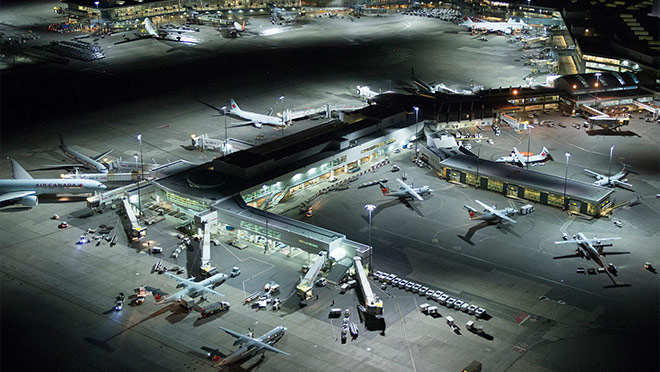How YVR piloted a new energy model during COVID-19

'A world class sustainable airport'
YVR is one of the biggest and busiest airports in Canada. Located on 3,300 acres, YVR has won many awards, including the Skytrax Best North American Airport award in 2007 and for a record number of consecutive years between 2010 and 2021.
YVR's vision is to be 'a world class sustainable airport'. Passengers enjoy calming interior with running water, greenery and rocks reflecting B.C.'s natural environment. But this vision also runs much deeper. For over 20 years, YVR has partnered with BC Hydro, following strategic energy management (SEM) practices to reduce the airport's energy use and carbon footprint. Despite traffic increasing year over year, YVR achieved carbon neutrality in 2020 and is committed to achieving net zero emissions by 2030.
Leading this initiative is a BC Hydro-funded Industrial Energy Manager and YVR's own Energy Optimization team. Together, they target, plan, deliver and monitor energy-saving opportunities including capital projects, operational improvements and behavioural-change initiatives.
COVID increases collaboration
When COVID-19 started to seriously affect international travel, it was clear to the team that their approach would need to take a different route. In 2019, YVR welcomed 26.4 million passengers. But in 2020, numbers dropped by over 70% to 7.3 million – seriously disrupting their detailed energy modeling and projections. YVR's Energy Manager wasted no time bringing in Prism Engineering to help the team:
- Understand the pandemic's impact on its energy plan
- Assess how their aggressive energy efficiency and sustainability goals could still be met
- Adapt their existing modeling and baseline to account for these dramatic changes
"For years, we've valued the shared resources and collaboration offered by the NW SEM Collaborative," says Kevin Wallace, Senior Program Manager at BC Hydro. "The continual knowledge transfer and best practice sharing has been really important to our team and our customers. So when YVR needed to update their energy model, the tools developed by the SEM Collaborative were top of mind."
Navigating the pandemic
An energy modeling selection guide created by the NW SEM Measurement and Verification Workgroup provided the insight needed to help adjust YVR's SEM model. Working with BC Hydro and Prism, YVR's Energy Manager was able to create a new energy model that uses the original baseline up to February 2020 and then reflects the COVID-19 impact from March 2020 onwards. With this new energy baseline, YVR can stay on track with its sustainability goals by confidently tracking operational usage and savings for as long as the airport is impacted by the pandemic.
"SEM is not something that we can effectively accomplish on our own," says Kevin. "It takes constant communication, learning, and collaboration to make sure we're staying on top of the latest insights and employing the smartest tools. The NW SEM Collaborative's tools have allowed us to achieve this at a critical moment when we were all working hard to find ways to adjust to a COVID world."
David McPhie, Senior Environmental Specialist and Energy Manager at Vancouver Airport Authority is excited about the future. "The support that BC Hydro has given YVR over the years has been invaluable," explains David. "The pandemic has been an unprecedented event that made re-baselining and forecasting a challenge, but the adjustments we have made demonstrated that savings are still traceable in this period of change and uncertainty. Being strategic, using established energy management best practices, and making data driven decisions is key to achieving energy efficiency at YVR, and will be essential as we strive for net zero emissions by 2030."
Can we help your business track savings?
If it's been tough staying on top of your energy goals during the pandemic, take a look at our SEM programs and resources, contact your Key Account Manager or Regional Energy Manager, or call us at 604 522 4713 in the Lower Mainland or 1 866 522 4713 elsewhere in B.C.